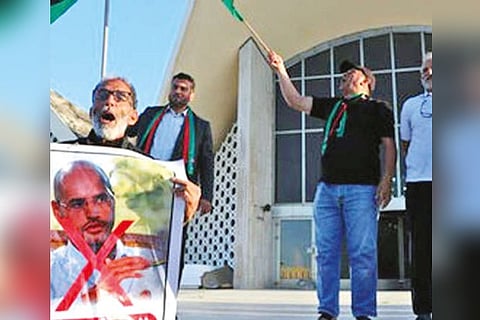

New York
On Sunday, in the electoral authorities’ office in the southwestern city of Sabha, Seif al-Islam Gaddafi submitted his candidacy for Libya’s upcoming presidential elections. The elections are due to be held on December 24 this year.
Seif al-Islam’s father ruled Libya for 42 years until his regime was brought down by a revolution in late 2011. Moammar Gaddafi was renowned for his eccentricity and brutality and was killed by his opponents in October 2011. Of Moammar’s seven sons, three were killed after the revolution, which turned into a violent civil war.
Shortly after the uprising that toppled the Gaddafi regime, Seif al-Islam, who is Moammar’s second-eldest son, was imprisoned by tribal militias in Zintan, northwestern Libya. He was released in 2017 and the 49-year old was thought to still be living among his former captors.
In 2015, he was sentenced to death in absentia for his part in the former regime but this was overturned in 2016. The International Criminal Court also has an outstanding warrant for his arrest for, among other things, crimes against humanity committed in 2011.
Although it may seem surprising to those outside Libya that a Gaddafi could return to politics, long-time Libya observers say that Gaddafi junior actually has a chance to gain power. This is mostly because of the increasingly fragmented nature of the Libyan political scene.
In the recent past, the country’s various factions were more easily classified. For example, in 2011, they were either pro-revolutionary or pro-Gaddafi.
Over the past few years as civil war broke out, they could be split into eastern or western factions, as the two major groups fighting for control of the country had strongholds at either end of the nation.
But now, as Tim Eaton, a senior researcher at Chatham House, recently told DW, “there is no actor or group that can clearly dominate the Libyan political scene.
It has become very complicated and very localised. It’s like a game of 3D chess with different leaders and networks trying to forge alliances, or perhaps working on certain things together but on a limited basis.” Seif al-Islam’s candidacy is likely to further complicate things.
“So far, his candidacy has not resulted in anything but confusion, prompting all regional and international players to rearrange their cards,” Abdullah al-Kabir, a Libyan political analyst, explained. “In fact, this will only complicate the political process in Libya more. I don’t expect elections to be held on time,” he told DW.
“I think it’s definitely going to have a huge impact on the political landscape and alliances are going to shift a lot,” agreed Mohamed Omar Dorda, one of the co-founders of for-profit consultancy Libya Desk, which has worked with German think tanks, including the Konrad Adenauer and Friedrich Ebert foundations, and is well networked inside the country and with the former regime. “It will force everyone to think differently, particularly the one-man-parties.”
A number of nations have become increasingly involved in the Libyan conflict over the past decade. They include Turkey, Egypt, Russia, the United Arab Emirates and Qatar, all of which are pursuing their own agendas in the oil-rich country, having previously sent mercenaries there to fight on their behalf. They also all back certain candidates in the upcoming election.
Visit news.dtnext.in to explore our interactive epaper!
Download the DT Next app for more exciting features!
Click here for iOS
Click here for Android